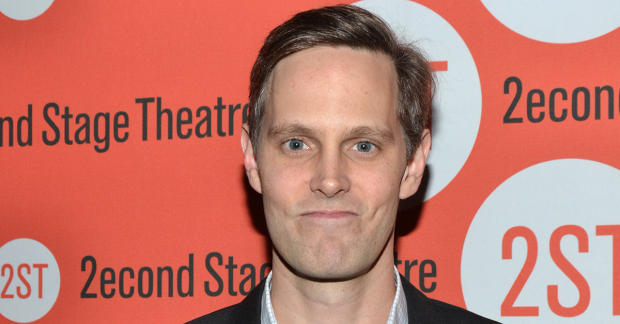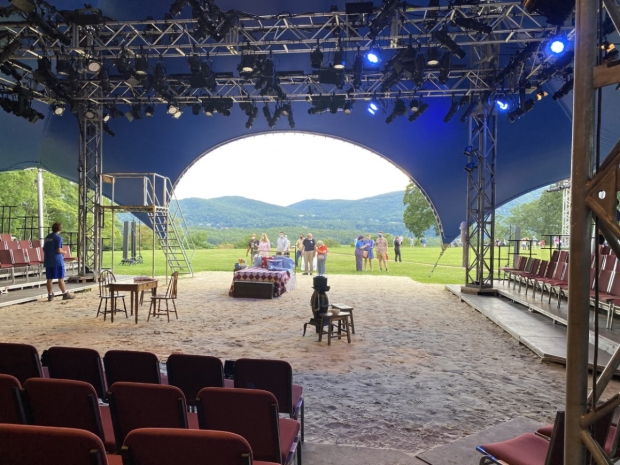Interview: How Hudson Valley Shakespeare Festival Is Adapting to the New World
Artistic director Davis McCallum discusses the theater’s past, present, and future.
For all theaters, the return to live performance in the wake of both the Covid pandemic and last year's social-justice reckoning has been a long and difficult path. When it came time to plan its in-person summer season, Hudson Valley Shakespeare Festival, led by artistic director Davis McCallum, took both of those tentpoles into consideration. The result was a company that was scrupulous when it came to safety measures for both audiences and performers, and firm in its intention to create theater that spoke to the moment. Here, McCallum tells us about what went into planning such a year, and how it's all turned out.

(© David Gordon)
Hudson Valley Shakespeare Festival is one of the more cautious theaters I've encountered over the last few months when it comes to safety protocols — masks on the grounds, must show vaccine status, separations between audience pods. Tell me about what this summer has been like for you and your team.
When we first started planning the season, our protocols meant that we were going to have 178 seats in a theater that normally seats 530, which is really, really challenging from an economic standpoint. A couple weeks before performances started, New York State loosened their guidelines and we came up with a plan for almost 300 seats under the tent, which is still nowhere near capacity.
After the Fourth of July, we thought, "Oh, can we loosen up our protocols," and we're feeling glad we didn't, since we're having, as everybody is, the Delta variant conversation now. We had a moment where people were like, "Must we wear masks in this place or that, or must I show you proof of our vaccination status or negative test," but we've been pretty rigorous about that stuff because it does increase people's safety and comfort.
To be candid, we haven't hit that capacity level on a lot of nights. We were worried that the seats that we had were going to sell out like that, and that we'd then have to have a lot of difficult conversations. But the audiences that are there are extremely enthusiastic about being there, so we're not sweating it. It's a cautious and deliberate return to live performance.
This season is very loaded in general, both as the first return to live performance since the pandemic started, and as the first theater season since the countrywide reckoning regarding racial justice. On a personal level, it's the company's last season at Boscobel House and Gardens. How do you, as artistic director, plan a season that hits so many different markers like that?
Since it's our last season at Boscobel before we move to a new home, I gravitated towards The Tempest, because it has a sense of a valedictory note and feels like a celebration of the act of theater-making. We had considered James Ijames's The Most Spectacularly Lamentable Trial of Miz Martha Washington for programming in 2020, but in the wake of George Floyd's murder and the national reckoning with racial justice, the moment now was right for it. We had company members we thought would be terrific in particular roles, and we also thought that producing a play set in 1800 on the grounds of a mansion built in 1803, in the context of the national conversation about the legacy of slavery and racism in America was all of those things coincided.
One thing I should say is, normally we produce plays in rotating rep, in a kind of old-fashioned model. This year, in part because of Covid, we decided to prioritize making live, in-person theater that's safe and sustainable for artists and audiences, so we're doing the plays serially, although there is overlap between the two casts.

(© David Gordon)
How is the theater adapting to the greater emphasis on equity and inclusion?
We determined that we wouldn't just default back to the old ways of making theater. There is a real intentionality around equity and inclusion for our company. We had a facilitator come in and help us craft session agreements for the company even before we started to address ourselves to the play, and that was extremely helpful. We wanted to prioritize a people-centered approach to making work and prioritize process over product, and make sure that everybody felt comfortable, because we were asking artists to take a courageous leap of faith. Would they be safe, particularly working on difficult material, performing outside, returning to the act of live performance and all the unexpectedness that comes with it, after 18 months away?
So far, I think we've felt really good about the work itself and the way we've done that work. A lot of credit goes to the director, Taylor Reynolds, who created an extremely safe and collaborative space. The company feels like theres an extremely high level of trust between them, which is necessary when you're tackling material like Miz Martha. That company had each other's back and could trust each other so that they were able to play with a kind of freedom, despite the challenge and difficulty of material that is about trauma.
Tell me about the new venue.
It's about 3 miles from our campus. It's 98 acres and also has this astonishing view of the Hudson River. We have an incredible team of designers, and the longterm vision includes not only a permanent open-air theater, but also includes a smaller indoor theater with about 225 seats, plus onsite artists housing, which will be a terrific way to bind our company together and to the work. It also has a restaurant, bar, and wedding space. We're going through the local planning board process now and the hope is that we'll be able to move our current tent to the new location in 2022 and 2023, and then the permanent theater location will open in 2024.







